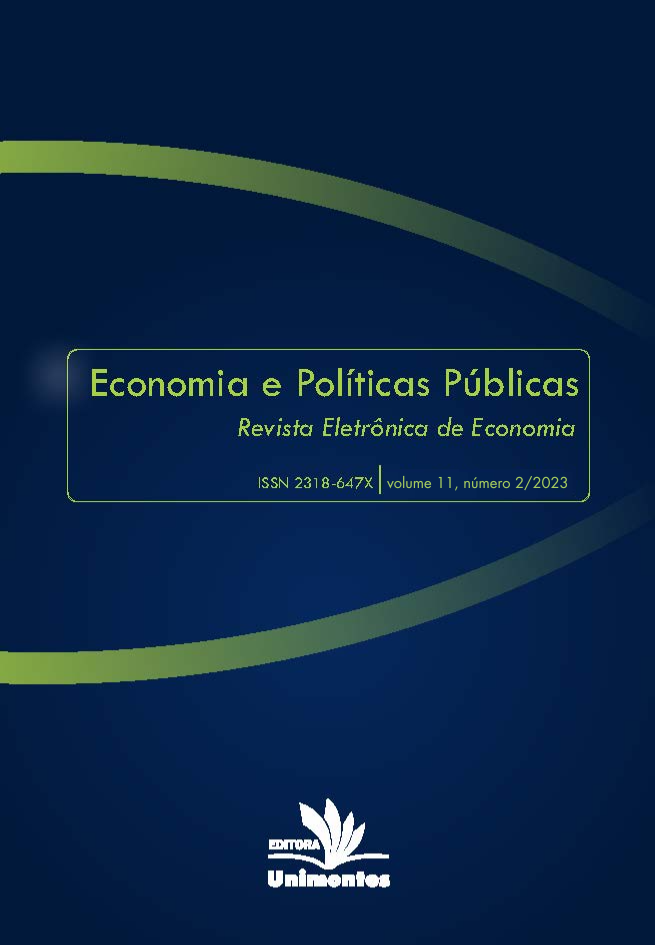What is new in the European fiscal framework under discussion?
DOI:
10.46551/epp2023v11n0205Resumo
Resumo: A situação fiscal da Europa tem sido objeto de discussão devido à sua incapacidade de garantir índices de endividamento específicos e instrumentos adequados para lidar com eventos imprevistos. Os membros não conseguiram cumprir tanto as regras preventivas quanto corretivas. Em geral, as regras fiscais rígidas mostraram-se ineficazes na aplicação do cumprimento. Em vez disso, as discussões recentes evoluíram para favorecer parâmetros de médio prazo mais flexíveis, simples e específicos para cada país na condução da política fiscal. Este artigo apresentará os principais argumentos contra o atual quadro e a discussão recente sobre possíveis melhorias.
Palavras- chave: política fiscal, quadro fiscal europeu.
Abstract: The European fiscal framework has been under discussion because it was unable to guarantee targeted debt ratios and adequate instruments to deal with unanticipated events. Members failed to comply with both preventive and corrective rules. Overall, rigid fiscal rules have proven to be ineffective in enforcing compliance. Instead, recent discussions evolved to favour more flexible, simple, and country-specific medium-term parameters for conducting fiscal policy. This article will present the main arguments against the current framework and the recent discussion about possible improvements.
Key-words: fiscal policy, european fiscal framework
Downloads
Referências
Arnold N., Balakrishnan R., Barkbu B., Davoodi H. et al. (2022) 'Reforming the EU Fiscal Framework – Strengthening the Fiscal Rules and Institutions', IMF Departmental Papers, No. DP/2022/014, International Monetary Fund, September.
Blanchard, O., A. Leandro and J. Zettelmeyer (2021) 'Redesigning EU fiscal rules: from rules to standards', Economic Policy, 36(106): 195–236, available at: https://doi.org/10.1093/epolic/eiab003
Darvas, Z., P. Martin and X. Ragot (2018) 'European fiscal rules require a major overhaul', Bruegel Policy Contribution 2018/18, available at: https://www.bruegel.org/policy-brief/european-fiscal-rules-require-major-overhaul
Darvas, Z. (2021) 'When the future changes the past: fiscal indicator revisions', Bruegel blog, available at: https://www.bruegel.org/blog-post/when-future-changes-past-fiscal-indicator-revisions
Darvas, Z. (2023) 'Fiscal rule legislative proposal: what has changed, what has not, what is unclear?', Bruegel blog, available at: https://www.bruegel.org/analysis/fiscal-rule-legislative-proposal-what-has-changed-what-has-not-what-unclear
Deutsche Bundesbank (2017) 'Design and implementation of the European fiscal rules', Monthly Report, June 2017, p. 29-44.
European Commission (2023a) 'A proposal for amending Council Directive 2011/85/EU on requirements for budgetary frameworks of the Member States', available at: https://economy-finance.ec.europa.eu/system/files/2023-04/COM_2023_242_1_EN.pdf.
European Commission (2023b) 'A proposal for amending Council Regulation (EC) No 1467/97 on speeding up and clarifying the implementation of the excessive deficit procedure', available at: https://economy-finance.ec.europa.eu/system/files/2023-04/COM_2023_241_1_EN.pdf.
European Commission (2023c) 'A proposal for replacing Regulation (EC) No 1466/97 on the strengthening of the surveillance of budgetary positions and the surveillance and coordination of economic policies', available at: https://economy-finance.ec.europa.eu/system/files/2023-04/COM_2023_240_1_EN.pdf.
International Monetary Fund - IMF (2022). The Return to Fiscal Rules. IMF Staff Discussion Note No. 2022/002.
Downloads
Publicado
Como Citar
Edição
Seção
Licença
Copyright (c) 2023 Revista Economia e Políticas Públicas

Este trabalho está licenciado sob uma licença Creative Commons Attribution-NonCommercial-NoDerivatives 4.0 International License.
Os trabalhos publicados não serão remunerados em hipótese alguma.
O (s) autor (es), ao submeterem o trabalho à análise, automaticamente cedem os direitos de publicação à Revista, em sua versão eletrônica. e/ou impressa (A revista também será impressa e depositada em algumas bibliotecas de referência) licenciado sob a Licença Creative Commons Attribution (CC BY-NC-ND 4.0).
Os autores dos trabalhos aprovados NÃO terão direito a qualquer exemplar da edição em que constar sua publicação, pois trata-se de versão eletrônica.
Serão aceitos trabalhos com, no máximo, três autores.
Todos os casos não previstos serão analisados e decididos pelo Conselho Editorial que, dentre outras atribuições, ficará encarregada de informar aos autores da possibilidade da publicação, contra os quais não caberá recurso.





















